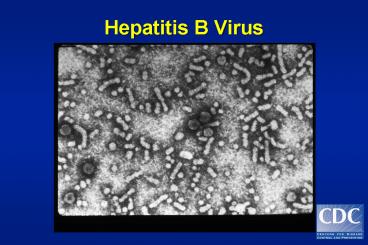Epidemiology and Prevention of Viral Hepatitis A to E: - PowerPoint PPT Presentation
1 / 15
Title:
Epidemiology and Prevention of Viral Hepatitis A to E:
Description:
Epidemiology and Prevention of Viral Hepatitis A to E: Author: David L. Smith Last modified by: VTaylor Created Date: 4/1/1997 6:07:08 PM Document presentation format: – PowerPoint PPT presentation
Number of Views:435
Avg rating:3.0/5.0
Title: Epidemiology and Prevention of Viral Hepatitis A to E:
1
Hepatitis B Virus
2
Hepatitis B - Clinical Features
- Incubation period Average 60-90 days
- Range 45-180 days
- Clinical illness (jaundice) lt5 yrs,
lt10 ³5 yrs, 30-50 - Acute case-fatality rate 0.5-1
- Chronic infection lt5 yrs, 30-90 ³5
yrs, 2-10 - Premature mortality fromchronic liver
disease 15-25
3
Acute Hepatitis B Virus Infection with Recovery
Typical Serologic Course
Symptoms
HBeAg
anti-HBe
Total anti-HBc
Titer
anti-HBs
IgM anti-HBc
HBsAg
0
4
8
12
16
24
28
32
52
100
20
36
Weeks after Exposure
4
Progression to Chronic Hepatitis B Virus Infection
Typical Serologic Course
Acute (6 months)
Chronic (Years)
HBeAg
anti-HBe
HBsAg
Total anti-HBc
Titer
IgM anti-HBc
Years
0
4
8
12
16
20
24
28
32
36
52
Weeks after Exposure
5
Rate of Reported Hepatitis B by Age Group United
States, 1990
25
20
15
Rate (per 100,000)
10
5
0
0-14
15-19
20-29
30-39
40
Age Group (Years)
Source CDC Viral Hepatitis Surveillance Program
6
Age at Aquisition of Acute and Chronic HBV
Infection United States, 1989 Estimates
(4 ) Perinatal (24) (4) Children
(12) (1-10 yrs) (8) Adolescent (6)
Adult (59)
Adult (83)
Acute HBV Infections
Chronic HBV Infections
7
Outcome of Hepatitis B Virus Infection by Age at
Infection
100
100
80
80
60
60
Chronic Infection
Chronic Infection ()
Symptomatic Infection ()
40
40
20
20
Symptomatic Infection
0
0
1-6 months
7-12 months
Older Children and Adults
Birth
1-4 years
Age at Infection
8
Global Patterns of Chronic HBV Infection
- High (³8) 45 of global population
- lifetime risk of infection gt60
- early childhood infections common
- Intermediate (2-7) 43 of global population
- lifetime risk of infection 20-60
- infections occur in all age groups
- Low (lt2) 12 of global population
- lifetime risk of infection lt20
- most infections occur in adult risk groups
9
Geographic Distribution of Chronic HBV Infection
HBsAg Prevalence
³8 - High
2-7 - Intermediate
lt2 - Low
10
Concentration of Hepatitis B Virus in Various
Body Fluids
Low/Not
High
Moderate
Detectable
blood
semen
urine
serum
vaginal fluid
feces
wound exudates
saliva
sweat
tears
breastmilk
11
Hepatitis B Virus Modes of Transmission
- Sexual
- Parenteral
- Perinatal
12
Risk Factors for Acute Hepatitis B United States,
1992-1993
Heterosexual (41)
Injecting Drug Use (15)
Homosexual Activity (9)
Household Contact (2)
Health Care Employment (1)
Unknown (31)
Other (1)
Includes sexual contact with acute cases,
carriers, and multiple partners. Source CDC
Sentinel Counties Study of Viral Hepatitis
13
Elimination of Hepatitis B Virus Transmission
United States
Objectives
- Prevent chronic HBV Infection
- Prevent chronic liver disease
- Prevent primary hepatocellular carcinoma
- Prevent acute symptomatic HBV infection
14
Elimination of Hepatitis B Virus Transmission
United States
Strategy
- Prevent perinatal HBV transmission
- Routine vaccination of all infants
- Vaccination of children in high-risk groups
- Vaccination of adolescents
- all unvaccinated children at 11-12 years of age
- high-risk adolescents at all ages
- Vaccination of adults in high-risk groups
15
Estimated Incidence of Acute Hepatitis B United
States, 1978-1995
HBsAg screening of pregnant women recommended
80
Infant immunization recommended
Vaccine licensed
70
60
OSHA Rule enacted
50
Cases per 100,000 Population
Adolescent immunization recommended
40
30
20
Decline among homosexual men HCWs
Decline among injecting drug users
10
0
78
79
81
82
83
84
85
87
88
89
90
91
92
93
94
95
80
86
Year
Provisional date































